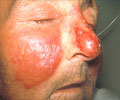
Bacterial geneticist Victoria Korolik of Griffith University's Institute for Glycomics and colleagues have been looking closely at how the bacteria Campylobacter jejuni infects gut cells in animals and humans.
"This is the most frequent cause of any gastrointestinal illness around the world," she said.
The bacteria are a normal part of a chicken's gut flora and only cause disease in humans and higher primates, typically through contaminated food.
The bacteria also cause the auto-immune disease Guillain-Barre syndrome, in which the immune system kills off the body's own nerve cells.
Two years ago, Korolik and team, including senior researcher Christopher Day, published key findings that provided the first clue to understanding why humans but not chickens are vulnerable to the bacteria.
Advertisement
They found that when grown at 37 degree Celsius (the body temperature of humans), C. jejuni bound to a range of sugars more common in mammals, but when it was grown at 42 degree Celsius (the body temperature of chickens), the bacteria bound to a different range of sugars more common in chickens.
Advertisement
Temperature also affects the proteins on the surface of the bacteria, but in a different way.
Korolik said if her team could confirm that the proteins and sugars they've identified enable the C. jejuni infection of humans, they could develop therapeutic molecules that can block the binding.
She said therapeutics could be added to chicken feed to reduce bacterial infection and be given to humans as a preventative or treatment for infection.
She also said the interaction between sugars in bacteria and human gut cells is also important in responding to the rare Guillain-Barre syndrome.
The interactions between sugars in bacteria and human gut cells may also have broader implications for research into treatments for food-borne infectious disease, said Korolik.
For treatment of bacterial-related food-borne disease, the research could provide alternatives to antibiotics, which is important given the problem of antibiotic resistance, she added.
The study is appearing in PLoS ONE.
Source-ANI














